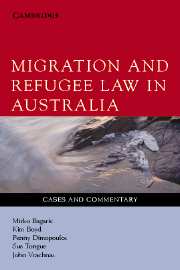Book contents
- Frontmatter
- Contents
- Detailed table of contents
- Table of cases
- Table of statutes
- 1 Thinking about migration law and national borders: An aspirational benchmark?
- 2 Introduction to Australian immigration law
- 3 Family and interdependency visas
- 4 Business and investment and skill-based visas
- 5 Temporary visas
- 6 Miscellaneous visas
- 7 Common visa requirements
- 8 Introduction to Australian refugee law: The Refugees Convention in Australian domestic law
- 9 Convention grounds
- 10 Persecution
- 11 Well-founded fear of persecution
- 12 Limits on protection of refugees: Cessation, exclusion exceptions and protection by another country
- 13 Cancellation of visas
- 14 Judicial review
- 15 Migration and human rights
- Index
4 - Business and investment and skill-based visas
Published online by Cambridge University Press: 05 June 2012
- Frontmatter
- Contents
- Detailed table of contents
- Table of cases
- Table of statutes
- 1 Thinking about migration law and national borders: An aspirational benchmark?
- 2 Introduction to Australian immigration law
- 3 Family and interdependency visas
- 4 Business and investment and skill-based visas
- 5 Temporary visas
- 6 Miscellaneous visas
- 7 Common visa requirements
- 8 Introduction to Australian refugee law: The Refugees Convention in Australian domestic law
- 9 Convention grounds
- 10 Persecution
- 11 Well-founded fear of persecution
- 12 Limits on protection of refugees: Cessation, exclusion exceptions and protection by another country
- 13 Cancellation of visas
- 14 Judicial review
- 15 Migration and human rights
- Index
Summary
Overview
There are a range of visas available to people who have a demonstrated capacity to strengthen Australia's economy. These visa categories fall into three general groups. The first category is business visas, which require the applicant to have a successful business. The second visa category is for people who will invest money and operate in designated areas.
The third category is available to people with skills that are needed in Australia. There are three sub-categories of visas in the skills stream of permanent visas: general skilled, employer nominations and distinguished talent. There are a further two temporary skilled sub-classes that are precursors to obtaining permanent residence.
An underlying theme to business, investment and skills-based visas is that they provide a strong illustration of the fact that migration law is essentially founded on national interest, rather than global humanitarian objectives. People with money, business acumen or rare skills are admitted into Australia not because of an underlying concern and respect for those people, but simply because they are likely to add more to the collective pool of national resources than they are likely to take from it. They will have a net positive impact on the economy, and hence are welcomed into Australia.
All business skills applicants (with the exception of sub-class 132 business talent applicants) who apply after 1 March 2003 to come to Australia to establish or buy into a business or make a designated investment must first apply for a temporary (provisional) visa.
- Type
- Chapter
- Information
- Migration and Refugee Law in AustraliaCases and Commentary, pp. 92 - 125Publisher: Cambridge University PressPrint publication year: 2006



